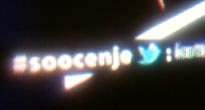
Supporting events on Twitter is becoming very popular, and it's a perfect case study of what Twitter can do. After all, this channel allows an additional layer for following things that are going on in real-life, in real-time. Coverage sometimes happens accidentally, if there are enough Twitterers around, but more and more often, it happens as a result of a carefully planned tactic of those behind the event. Only then it can fully work, enabling organizers, participants and observers a totally new type of involvement. Crowdsourcing event support can produce a better overview of what's happening than any well-trained team of journalists can provide, offering an experience that is broad, objective and subjective, interactive. And like using Twitter itself, some know how to do it, and some don't.
...more
written 11:13 CET on chronolog
6610 views • 2 likes • • Like •